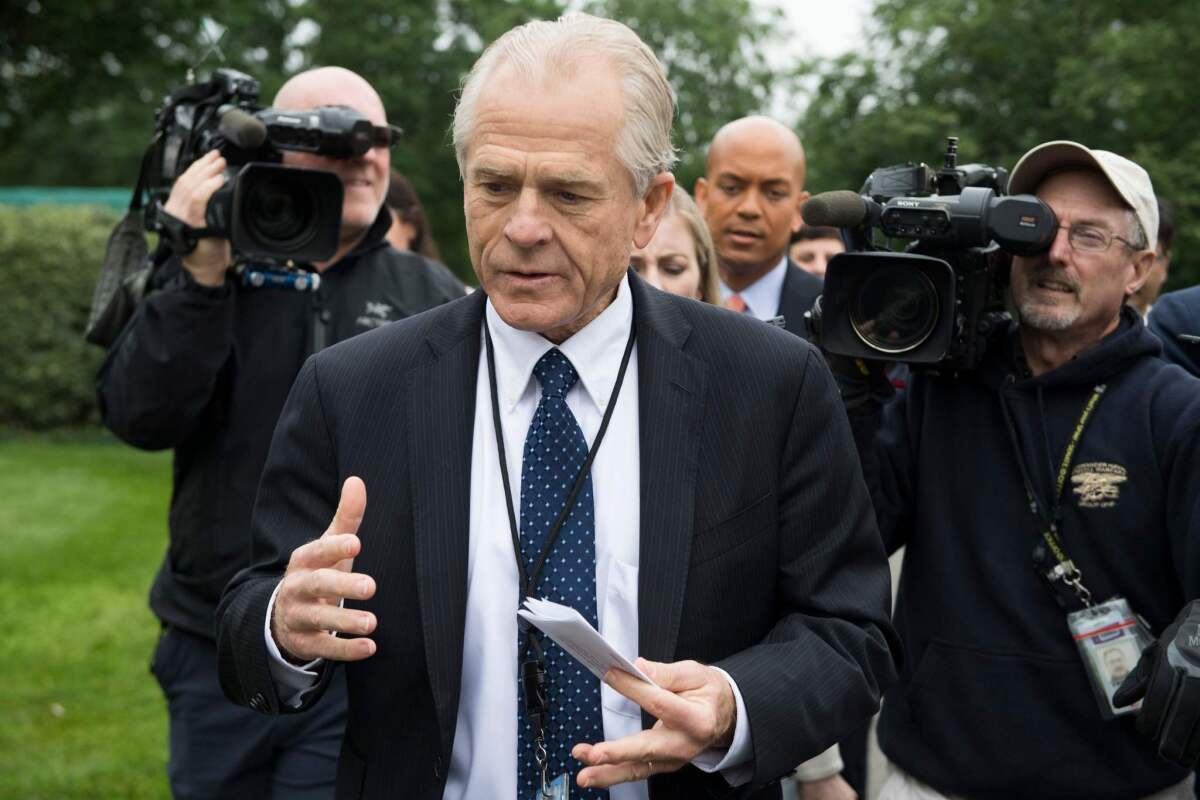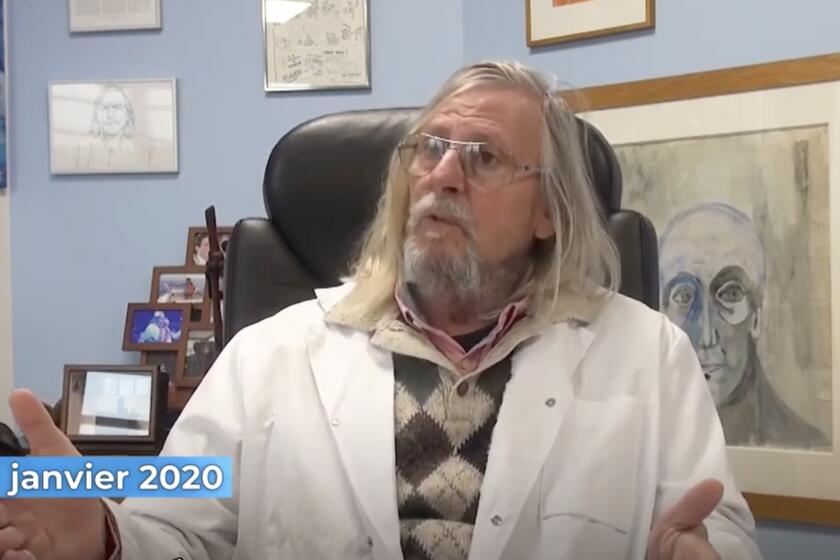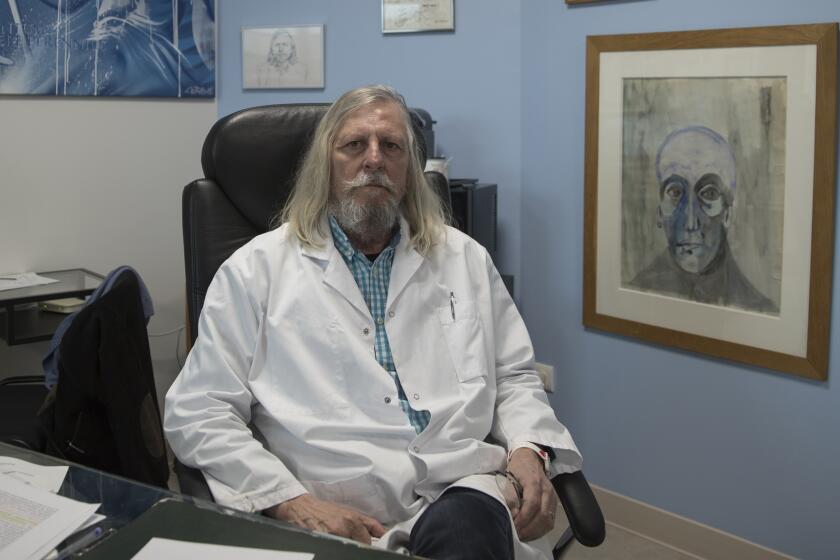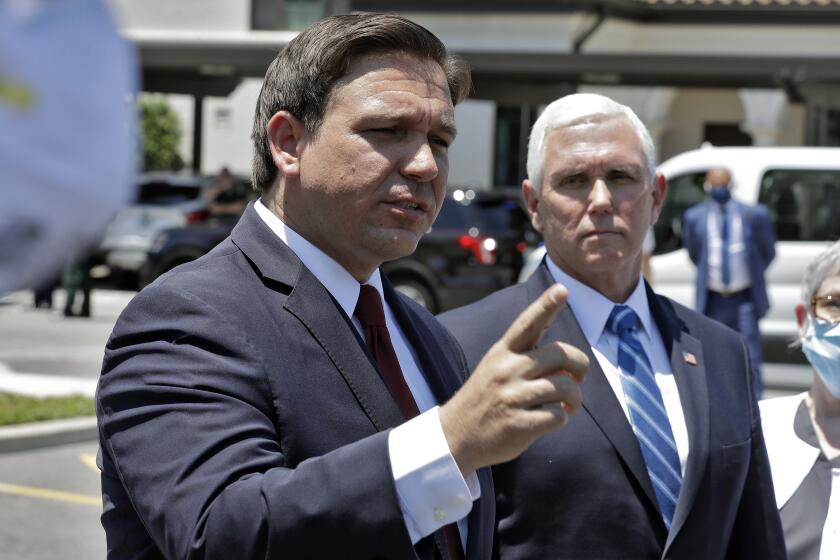Column: Chloroquine again? Trump touts a new flawed study of useless coronavirus ‘miracle’ drug

- Share via
Like a child capable of keeping only one idea in its head at a time, President Trump has continued his obsession with the antimalarial drug hydroxychloroquine as a treatment for the coronavirus despite an ever-growing body of work that it’s useless for the purpose.
This week, he was at it again.
Trump on July 6 tweet-touted a study from the “highly respected” Henry Ford Health System of Detroit, purporting to show that the drug “cut the death rate in certain sick patients very significantly.”
The amount of resources and effort expended on hydroxychloroquine based on so little data and prior plausibility has been staggering.
— Dr. David Gorski
Since everything in Trump’s world is about him, he asserted further that Democrats “disparaged” the study “for political reasons (me!.)” He also placed pressure on the Food and Drug Administration to approve the “miracle” drug.
This tweet would deserve a plaque on the Trump Ignorance Hall of Fame, if there were any wall space left in the hall. So let’s take a close look at the Henry Ford study. We should also put it in perspective by noting how Trump’s obsession with the antimalarial drug has interfered with the legitimate search for COVID-19 treatments.
It might be useful to begin with a quick gallop through the dismal history of the craze for hydroxychloroquine as a COVID-19 treatment, courtesy of veteran pseudoscience debunker David Gorski. The drug, it will be recalled, has been widely used to stave off malaria as well as an anti-inflammatory for chronic autoimmune conditions such as lupus and rheumatoid arthritis.
President Trump’s hype of a potential treatment for COVID-19 gives false hope to virus patients and causes real harm to others.
Claims about its effectiveness against COVID-19 began with the French scientist Didier Raoult. Although his methodology and conclusions were widely disparaged, even ridiculed, by medical experts, they were promoted by Trump and Dr. Mehmet Oz, among others.
This high-level attention prompted researchers to waste considerable time and energy designing and conducting medical trials of the drug, which have overwhelmingly found it to be of no use against the virus, and for some patients even medically hazardous. Meanwhile, stockpiling of the drug created shortages with life-threatening implications for patients who needed it for legitimate uses.
Trump’s obsession undermined the credibility of the FDA, which issued an emergency use authorization for hydroxychloroquine that gave laypersons the impression that the treatment had FDA approval. The agency eventually had to backtrack, issuing an advisory on June 15 cautioning against the use of the drug or the related drug chloroquine for COVID-19. By then, many major medical centers had ceased to prescribe the drug for their COVID patients.
Just as hydroxychloroquine finally seemed to have dropped off the radar as a COVID treatment, the Henry Ford study appeared. So what about that?
The study was a retrospective observational study of 2,541 adult patients hospitalized with COVID at the Henry Ford hospital. In other words, it looked at patients who had already been treated in March, April and May. Some had been given hydroxychloroquine, some a combination of hydroxychloroquine and the antibiotic azithromycin, some azithromycin alone, and some neither.
Of the entire group, 18% died in the hospital. But the mortality rate was 13.5% for those given hydroxychloroquine alone, 22.4% for those given the antibiotic alone, 20.1% for those given both and 26.4% for those given neither.
The researchers concluded that hydroxychloroquine given alone or with the antibiotic produced a “reduction in COVID-19 associated mortality.”
So far, so good. The Trump releection campaign put its customary partisan spin on the paper, stating “this is the same drug that the media and the Biden campaign spent weeks trying to discredit and spread fear and doubt around because President Trump dared to mention it as a potential treatment for coronavirus.”
A highly anticipated study finds that the Trump-touted coronavirus drug doesn’t work.
Trump trade advisor Peter Navarro, who may be the White House official least likely to be mistaken for a doctor, jumped on the bandwagon. He told White House reporters that the Henry Ford study demonstrated that research indicating the uselessness of the antimalarials against COVID were “bad science.”
However...
The truth is that retrospective studies of this sort are inferior to randomized controlled studies, the gold standard, for several reasons. They’re subject to biases, subtle and overt, because the researchers know what they’re looking for.
They’re subject to confounding variables, including the medical histories of the patients or the severity of their infections, that may not be evident to the researchers or readers. The patients may have received some treatments that aren’t part of the study, but may have a deciding impact on the results.
It turns out that all these flaws are present in the Henry Ford study. We know this in part because the International Journal of Infectious Diseases, which published the study, also ran an editorial comment that laid them out.
The most glaring flaw is that the patients given hydroxychloroquine, either alone or with the antibiotic, were twice as likely as the other patients to also have received a steroid. As Gorski points out, that’s important because a randomized controlled study has found that the steroid dexamethasone has “resulted in improved survival in COVID-19 patients requiring oxygen support.”
In other words, it may well be that the steroid had far more to do with the Henry Ford patients’ survival than the antimalarials.
Another major problem is that the study doesn’t explain why 16.1% of the patients — 409 of the 2,541 — received no treatment. It’s proper to conjecture that the reason is that they were in such bad condition that doctors saw no point in giving them an experimental drug. Remember, the patients weren’t part of a clinical trial — they were being treated based on their condition and the hospital’s COVID protocol.
Florida Gov. DeSantis represents all that’s wrong with America’s coronavirus response.
“Were the decision to withhold treatment related to poor prognosis,” the editorial observes, “it stands to reason that patients receiving neither hydroxychloroquine nor azithromycin would have the highest mortality.”
Another confounding element involves the time period over which these patients were treated. It has become clear that doctors and hospitals have become better at treating COVID-19 over time, which has apparently reduced the overall mortality.
The patients in this study aren’t broken down by when they were treated, so it’s possible that those showing lower mortality survived more because the hospital had learned how to keep them alive, not because they got these drugs. That factor isn’t examined in the study.
Put it all together, and the Henry Ford study doesn’t tell us what Trump says it does. That brings us to a broader concern about the chloroquine craze, also noted by the editorial: The 2,541 patients in the study could have provided researchers with a useful sample size for a randomized control study, which might have told us much more about hydroxychloroquine.
But that would have required foresight and patience. Instead, the Henry Ford doctors, like those at many other institutions, went hog-wild for hydroxychloroquine even though “there was little evidence to justify a hydroxychloroquine protocol at the outset of the pandemic,” the editorialists wrote.
The craze has left lasting scars on COVID research. According to an analysis by Stat News, one of every six trials of potential COVID treatments involved chrloroquine or hydroxychloroquine, both dry holes. That can be attributed to their promotion by Trump and his mouthpieces.
They made these drugs the center of a cult, Gorski says. “The amount of resources and effort expended on hydroxychloroquine based on so little data and prior plausibility has been staggering,” he wrote. “One wonders what other avenues of research far more likely to result in effective treatments have been delayed or foregone because of all the attention lavished on hydroxychloroquine.”
This is what happens when health advice is dispensed by politicians who are not doctors, but try to play one on TV. The result is more sickness and death.
More to Read
Inside the business of entertainment
The Wide Shot brings you news, analysis and insights on everything from streaming wars to production — and what it all means for the future.
You may occasionally receive promotional content from the Los Angeles Times.














